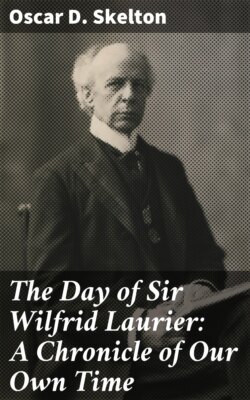Читать книгу The Day of Sir Wilfrid Laurier: A Chronicle of Our Own Time - Oscar D. Skelton - Страница 5
На сайте Литреса книга снята с продажи.
SIR ANTOINE AIMÉ DORION
From a photograph
ОглавлениеIn fact, Mr Laurier's health was the source of very serious concern. Lung trouble had developed, with violent hemorrhages, threatening a speedy end to his career unless a change came. Just at this time the chief of his party and his most respected friend, Antoine Dorion, suggested that he should go to the new settlement of Arthabaskaville in the Eastern Townships, to practise law and to edit Le Défricheur, hitherto published at L'Avenir and controlled by Dorion's younger brother Eric, who had recently died. Largely in the hope that the country life would restore his health, he agreed, and late in 1866 left Montreal for the backwoods village.
The founder of Le Défricheur, Eric Dorion, nicknamed L'Enfant Terrible for his energy and fearlessness, was not the least able or least attractive member of a remarkable family. He had been one of the original members of the Rouge party and, as editor of L'Avenir, a vehement exponent of the principles of that party, but had later sobered down, determined to devote himself to constructive work. He had taken an active part in a colonization campaign and had both preached and practised improved farming methods. He had founded the village of L'Avenir in Durham township, had built a church for the settlers there to show that his quarrel was with ecclesiastical pretensions, not with religion, and for a dozen years had proved a sound and stimulating influence in the growing settlement.
When Mr Laurier decided to open his law office in Arthabaskaville, the seat of the newly formed judicial district of Arthabaska, he moved Le Défricheur to the same village. Lack of capital and poor health hampered his newspaper activities, and, as will be seen later, the journal incurred the displeasure of the religious authorities of the district. Its light lasted barely six months and then flickered out. This left the young lawyer free to devote himself to his practice, which grew rapidly from the beginning, for the district was fast filling up with settlers. The court went on circuit to Danville and Drummondville and Inverness, and soon, both at home and in these neighbouring towns, no lawyer was more popular or more successful. The neighbouring counties contained many Scottish, Irish, and English settlers, who were soon enrolled in the ranks of the young advocate's staunch supporters. The tilting in the court, the preparation of briefs, the endeavour to straighten out tangles in the affairs of helpless clients, all the interests of a lawyer deeply absorbed in his profession, made these early years among the happiest of his career. Arthabaska was, even then, no mean centre of intellectual and artistic life, and a close and congenial circle of friends more than made up for the lost attractions of the metropolis.
But neither work nor social intercourse filled all the young lawyer's nights and days. It was in this period that he laid the foundation of his wide knowledge of the history and the literature of Canada and of the two countries from which Canada has sprung. Bossuet and Molière, Hugo and Racine, Burke and Sheridan, Macaulay and Bright, Shakespeare and Burns, all were equally devoured. Perhaps because of his grandfather's association with the Pangman seigneury (the property of the fur trader Peter Pangman), his interest was early turned to the great fur trade of Canada, and he delved deep into its records. The life and words of Lincoln provided another study of perpetual interest. Though Montreal was intensely Southern in sympathy during the Civil War, Mr Laurier, from his days as a student, had been strongly attracted by the rugged personality of the Union leader, and had pierced below caricature and calumny to the tender strength, the magnanimous patience, of the man. A large niche in his growing library was therefore devoted to memoirs of Lincoln and his period.
Congenial work, loyal friends, the company of the great spirits of the past—these were much, but not all. The crowning happiness came with his marriage, May 13, 1868, to Miss Zoë Lafontaine of Montreal. To both, the marriage brought ideal companionship and fulfilment. To the husband especially it brought a watchfulness that at last conquered the illness that had threatened, a devotion which never flagged—for Lady Laurier is still to-day much more a 'Laurierite' than is Sir Wilfrid—and a stimulus that never permitted contentment with second best.
The years of preparation were nearly over. The call to wider service was soon to come. The new Dominion, and not least Quebec, faced many difficult political problems. Aiding in their solution, the young lawyer in the quiet village of Arthabaska was to find full scope for all the strength of brain and all the poise and balance of temper which the years had brought him.
[1] Mes Contemporains, p. 85.
